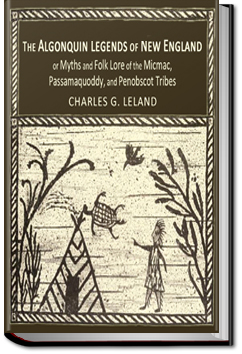

If Mr. Thoreau had known the Indian legend of the spirit of the fallen tree—and his guide knew it well—he might have been credited with speaking wisely of the poetry and mythology which he ridicules the poor rural Yankees for not possessing.
Such a writer can, indeed, peep and botanize on the grave of Mother
Nature, but never evoke her spirit.
The moving the island is evidently of Eskimo origin, since Crantz (History of Greenland) heard nearly the same story of some magician-giant. It was probably suggested by the very common floating away of ice-islands.]
How Glooskap, leaving the World, all the Animals mourned for him, and how, ere he departed, he gave Gifts to Men.
(Micmac.)
Now Glooskap had freed the world from all the mighty monsters of an early time: the giants wandered no longer in the wilderness; the cullo terrified man no more, as it spread its wings like the cloud between him and the sun; the dreadful Chenoo of the North devoured him not; no evil beasts, devils, and serpents were to be found near his home. And the Master had, moreover, taught men the arts which made them happier; but they were not grateful to him, and though they worshiped him they were not the less wicked.
"Now when the ways of men and beasts waxed evil they greatly vexed Glooskap, and at length he could no longer endure them, and he made a rich feast by the shore of the grea
Get ALL YOU CAN BOOKS absolutely FREE for 30 days. Download our FREE app and enjoy unlimited downloads of our entire library with no restrictions.
Have immediate access and unlimited downloads to over 200,000 books, courses, podcasts, and more with no restrictions.
Everything you download during your trial is yours to keep and enjoy for free, even if you cancel during the trial. Cancel Anytime. No risk. No obligations.
For just $24.99 per month, you can continue to have unlimited access to our entire library. To put that into perspective, most other services charge the same amount for just one book!

As avid readers, we understand the joy of immersing ourselves in a captivating story or getting lost in the pages of a good book. That's why we founded All You Can Books back in 2010, to create a platform where people can access an extensive library of quality content and discover new favorites.
Since our founding days, we’ve continuously added to our vast library and currently have over 200,000 titles, including ebooks, audiobooks, language learning courses, podcasts, bestseller summaries, travel books, and more! Our goal at All You Can Books is to ensure we have something for everyone.
Join our community of book lovers and explore the world of literature and beyond!
The book is old enough that some heavy-handed infantilism and noble savagery concepts are deep-baked into the writer's perspective, and they are not shy about sharing that.
Furthermore, there is the repeated assertion that many of the tales are taken from N